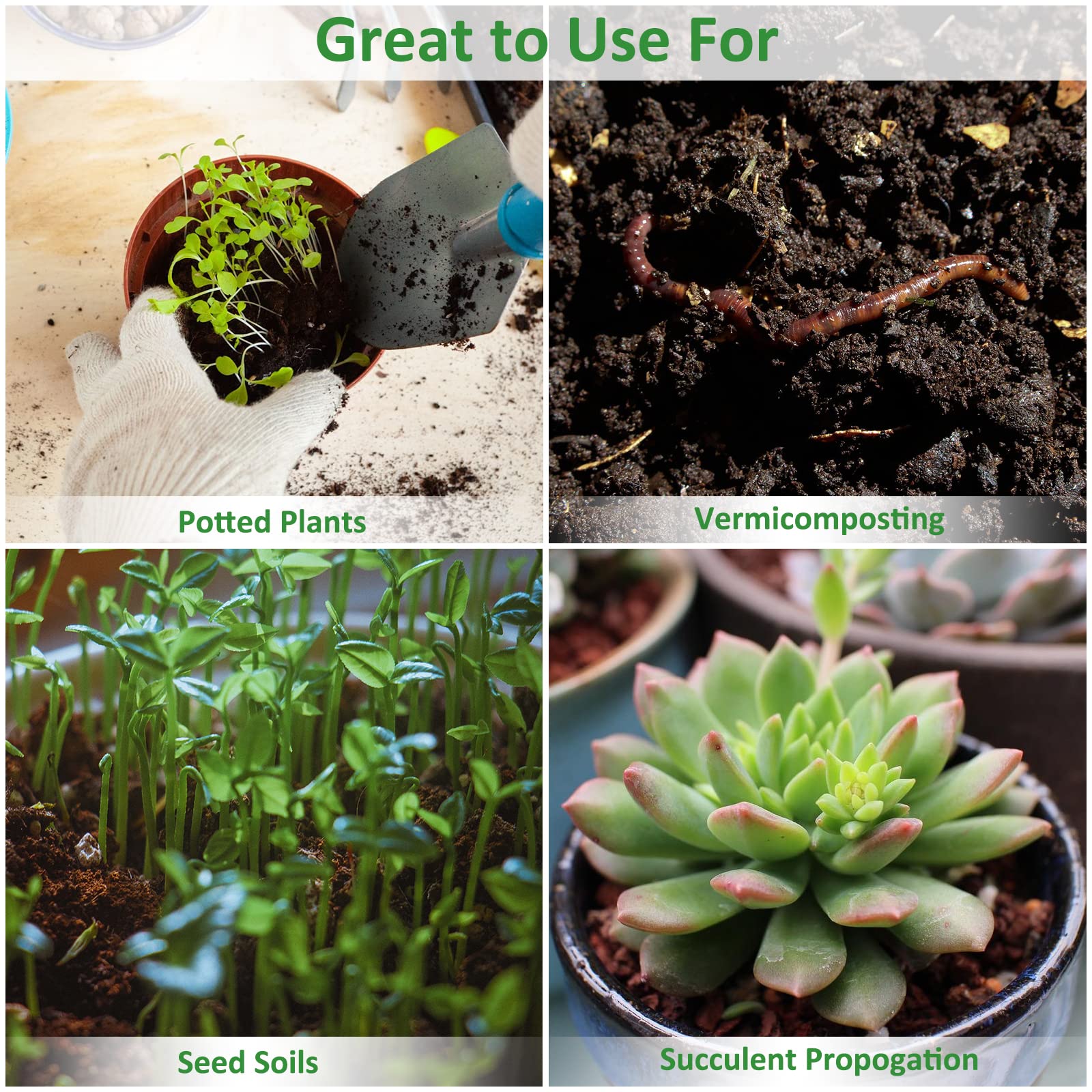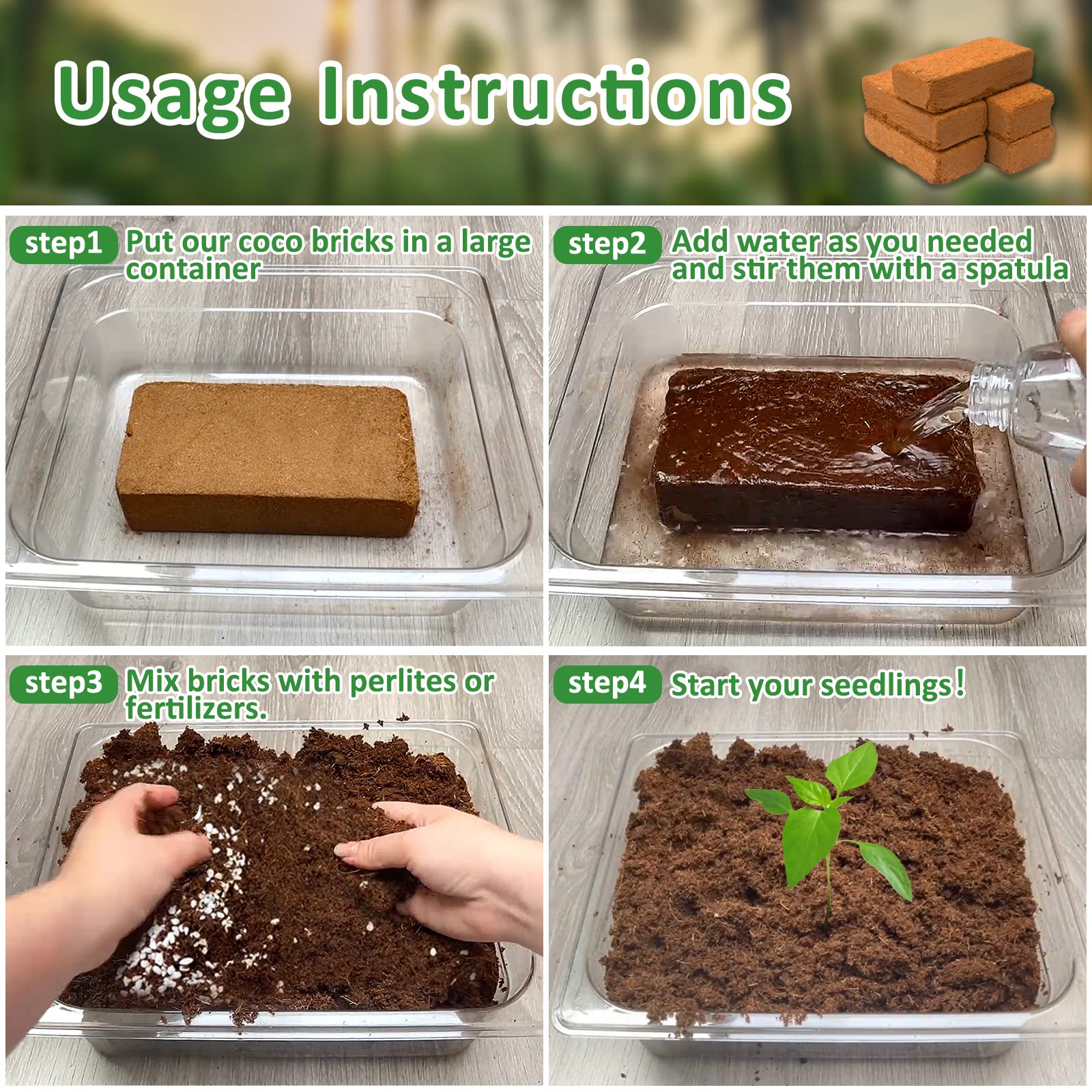معلومات عنا
دعم العملاء
احصل على التطبيق

قم بتوجيه الكاميرا لتنزيل التطبيق
حقوق الطبع والنشر © 2024 Desertcart Holdings Limited








🌿 Grow Green, Live Clean! 🌍
Riare's 6 x 650g Organic Coco Coir Bricks are made from 100% natural coconut fiber, providing an eco-friendly and sustainable substrate for all your gardening needs. Each brick expands significantly when hydrated, ensuring excellent moisture retention and breathability for your plants. Perfect for beginners and seasoned gardeners alike, these coco coir bricks are versatile enough for seed germination, potting mixes, and landscaping, making them an essential addition to any green thumb's toolkit.
| Product Dimensions | 20 x 11 x 11 cm; 635.03 g |
| Part number | Organische Kokosfaser |
| Manufacturer | Riare |
| Item model number | Organische Kokosfaser |
| ASIN | B0B3T8ZXXR |
G**S
Not quite 1.4lbs per brick, but still a very good product!
2023-11-06. Organic coco coir soil blocks by Riare. Natural compressed. Organic. Low EC. Balanced pH. High expansion. 8pcs. Coco brown.So what is Coconut Coir? Well coconut coir is the fibrous material between the outer husk of a coconut to the inner hard shell (aka the seed coat) that protects the fruit. Like the fruit, the coir fibers matures. When the coir fiber is young, it's white in color and more flexible. As it matures, it changes from white to brown and becomes less flexible. Brown coir is stronger than white coir.Coconut coir has become increasingly popular in the last couple of decades as are now in a wide range of textile products from clothing to bed linens. Coir has also become increasingly popular with planting and gardening, and for good reason, they have a host of benefits!Benefits of coconut coir for planting and gardening include:1) Retaining moisture. Coconut coir is every effective at retaining water, and can absorb up to 10 times it's weight in water.2) Insect neutral. Most garden and plant pests do not enjoy settling in coconut coir, adding an additional layer of defense for your plants.3) Environmentally safe. Although I'm a fan of using Sphagnum Peat Moss in the garden, there's no denying the environmental concerns peat moss poses when it breaks down over time. Unlike peat moss, coconut coir can be used more than once.4) Renewable resource. Peat moss comes from peat bogs, which are a limited resource. Coconut coir comes from coconuts, and is actually a waste product of the fruit. Coconut trees are also a renewable resource. Repurposing a product from a renewable resource is never a bad thing...However; along with the benefits, coconut coir does have some downsides as well:a) Coconut coir is inert. This means that it contains little to no nutrients (nitrogen, phosphorus, potassium or NPK) within it. While it has beneficial properties, it will not help your plants flourish.b) In addition to low NPK levels, you may find that your plants are also low on Calcium and Magnesium. To make these coir bricks more effective, you will need to supplement them with nutrients. This is simple enough to do, just mix the nutrients into the soil after the coir has been rehydrated. Alternatively, you can dissolve the nutrients into the hot water you use to rehydrate each brick. Nutrients you will want to add may include calcium, nitrogen, phosphate, potash, iron, zinc, and manganese.With the lesson on coconut coir complete, let's talk a bit about these coconut coir bricks by Riare. Each brick is about 2" x 4" x 8" and weight about 1 1/3lb (~600g) by my measurements. Rehydration is super easy, just add a gallon of hot tap water. I do need to warn you though, the claim is that it will expand to 8 times its size... and they're not kidding! Using a 9 gallon recycling box, the one brick filled about 2/3 of the bin! I went with the recycling box because of the dimensions. Wanting to add nutrients into the mix, I wanted something with a large opening. The recycling bin measured about 18"W x 10"D x 14"H, so I had plenty of room to work the nutrients into the mixture and break it down to ensure there were no big chunks. In doing so, it also introduces carbon, nitrogen, oxygen and hydrogen into the mixture.NOTE: Riare fully disclosed that this coir is without nutrients as all coir is; however, they did it discretely. In the product header they mention "LOW EC". EC stands for Electrical Conductivity, which essentially means that it has low salt content levels. This is most likely caused by the cleaning and compacting process. Low EC also translates to low nutrient levels.Overall, the coir worked out great for me. Having to have to add my own nutrients isn't the worse thing that can happen, after all, it allowed me to customize what I add. In the dehydrated and compacted form, these bricks take up very little space and are nice and light so they're easily transportable. At $3 a brick when you buy the 8 pack, this coco coir by Riare is economical, environmentally responsible, and makes a great peat substrate (base layer) for your plants or garden!FYI: One brick is enough to fill 6 sq ft of space with a 2" covering.
A**R
Great stuff!
Peat moss is actually NOT environmentally friendly in the fact that true peat takes a long time to grow naturally. This is a great alternative and just as awesome for you plants
J**T
Easy to use.
My plants were not doing well when I husband told me try this.I was skeptical at first but no more. The plants are doing much better now. It maintains moisture in the blend and not as much watering like the other brands of potting mix.
J**L
Very convenient
I like the blocks a lot. Easy and to rehydrate and move to the plant. Didn’t have to drag around the big bag of potting soil that’s difficult for me. Definitely order more soon
R**E
A more accurate tale of the product’s expansion
The media could not be loaded. I bought this product based on another reviewer mentioning that these bricks would expand to about 8 times their size. That’s an exaggeration. The bricks expand to probably 4 times their size max. I put one brick in a container with the dimensions 17x12x10in (rounding up) and it was filled halfway. I’ve heard a ton about coco coir and how it is good for raised beds, and patio gardening as well as seed starting. So I’m excited to get my patio garden started now that the weather is ideal. I’ve got some worm castings and perlite that I’ll add into my mix. Unfortunately I’ll have to buy a second set of bricks, as this is not as much growing media as I thought I would have for my project.
ترست بايلوت
منذ يومين
منذ أسبوع